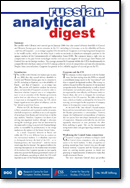Russia's New Political Leadership and its Implication for East Siberian Development and Energy Cooperation with North East Asian States

Author(s): Yoshinori Takeda
Editor(s): Jeronim Perovic, Robert Orttung, Matthias Neumann, Heiko Pleines, Hans-Henning Schröder
Series: Russian Analytical Digest (RAD)
Issue: 33
Pages: 5-8
Publisher(s): Center for Security Studies (CSS), ETH Zurich; Research Centre for East European Studies, University of Bremen
Publication Year: 2008
